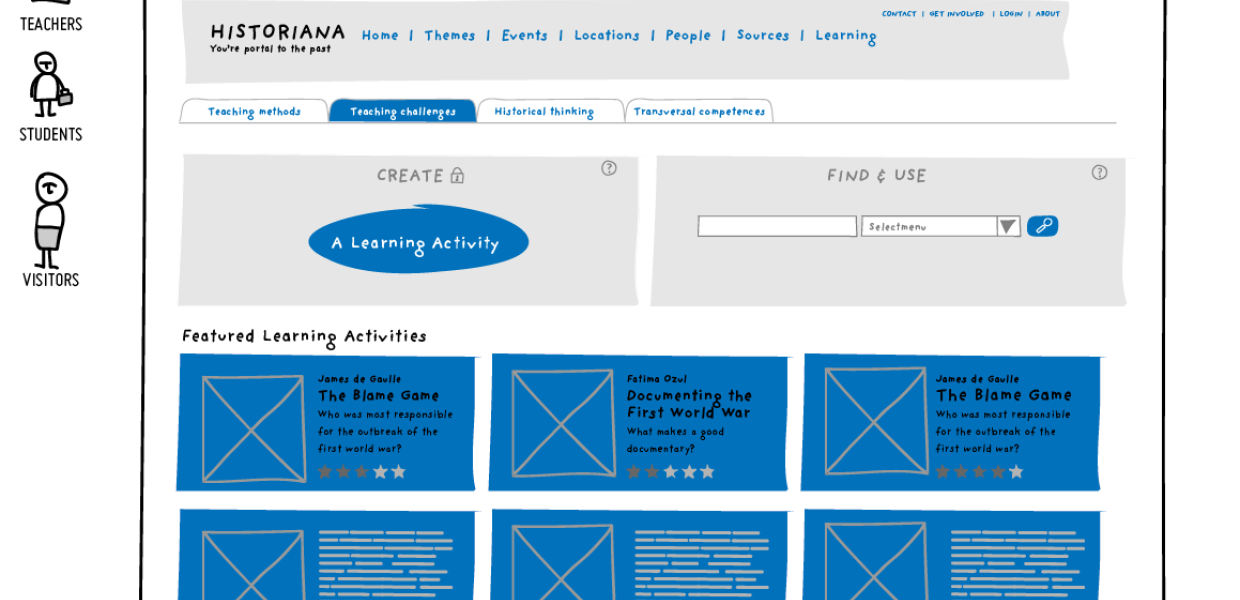The History Education Pilot Takes Off...

Within the Europeana Creative project, EUROCLIO (European Association of History Educators) and Webtic (web development company) are working on a pilot project that stimulates the re-use of content from Europeana and in history education, an important area for creative industries.
The history education pilot will offer history educators easy-to-find and free-to-use educational resources (sources, learning activities and tools) that are designed to stimulate historical thinking, multiperspectivity and active learning.
The focus of the history education pilot will be on the re-use of content that is relevant for the First World War. Material will be selected from Europeana projects, such as Europeana1914-1918 and the European Digital Film Gateway and used for the development of learning activities. The sources and learning activities are organised around content areas that highlight different aspects of the war, such as “Experiencing and Reporting the War” and “Remembering the War”.
Wireframe of the main page
The selection of sources and the development of learning activities are done by an international community of contributors, who are history education specialists from the EUROCLIO network. EUROCLIO plans to continue to work with a community of contributors from its network to tackle other key moments and development in history and heritage that are relevant in Europe and beyond.
Wireframes of the search and selection tool
Some of the issues and priority tasks until now have been: to explore and document key dates of the First World War and how related content could be used; to produce different mock-ups and designs for the main screens of the tool; to produce clear definitions of end-users and potential features of the site; to identify already existing tools or services which can be embedded; to identify filters for metadata; to identify content licensing issues.
EUROCLIO and Webtic are building on the experience gathered from the Historiana project, a pioneering initiative for exploring European history and heritage – a platform that will also be used to disseminate the educational resources developed in the pilot.
Mockup of the image analysis / selection tool
The pilot is being developed in collaboration with Europeana Network members, such as the Imperial War Museum and the Austrian National Library. The added value of working with the Europeana Network is that the sources from various content providers make it possible to create educational resources that are international and help educators to look beyond their national history.
The history education pilot stimulates the re-use of digitised heritage by:
- The creation of an international collection of sources – that are historically relevant and free to be re-used for education – around content areas that are common for history education across Europe.
- Making it easy for history educators and students to find these sources by adding metadata that is useful for history education to this collection and developing a search and selection tool.
- Using existing – and developing new – tools that can be used to stimulate innovative teaching and learning of history with digitised heritage online. The tools will be used to promote multiperspectivity in history education, as well as encourage critical thinking and effective analysis of sources.
- Working with a community of contributors on developing learning ideas (with students’ and teachers' material) that have been peer-reviewed, freely available, and demonstrate how the selected source material and tools can be used in practice.
- Presenting the learning activities on the Historiana website, making clear how the learning activities relate to specific historical content, historical thinking skills and other aspects of history education.
- Making PR material to present the sources collections, tools and learning activities as a package – around a key moment or development in history – that educators can pick and choose from.
The development of the tools are a direct result of the first co-creation workshops organised by Europeana Creative, which saw different user scenarios and prototypes generated and discussed along with previous research carried out by EUROCLIO.
At the moment, the team working on the pilot is working on the selection of source material as well as the development and prototyping of tools (detailed overview here). All the resources will be validated and evaluated by history educators within the context of Europeana. All results of the pilot are planned to be ready in July 2014.



